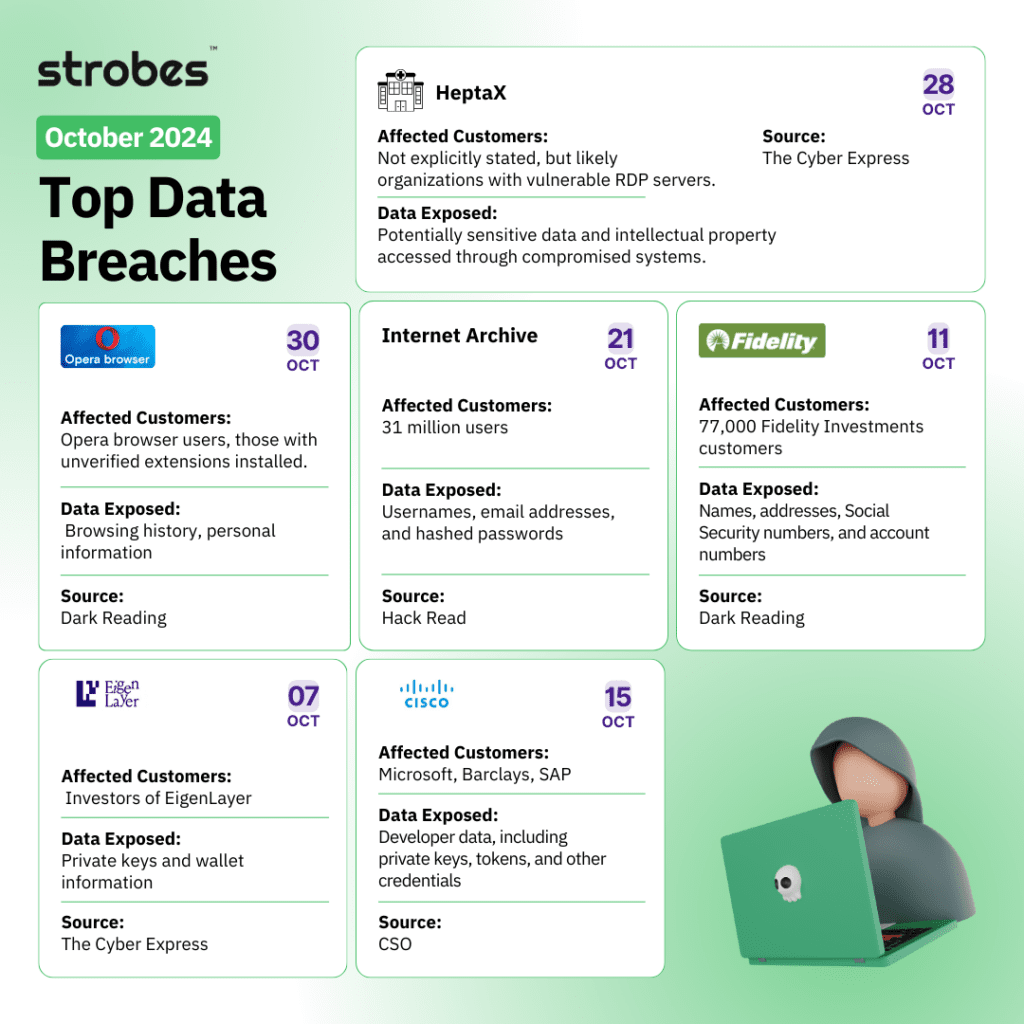October saw several high-profile data breaches, underscoring the ongoing urgency of strong cybersecurity measures. From tech giants to healthcare providers, multiple sectors experienced critical security incidents that exposed sensitive data. In this blog, we explore the biggest data breaches of October 2024, examining their causes and implications for businesses and users. Here’s a breakdown of the key incidents.

1. Fidelity’s Data Breach Exposes 77K Customer Records
In a recent security incident, Fidelity Investments, a major financial services firm, disclosed a data breach affecting approximately 77,000 customers. The breach resulted from unauthorized access to a limited set of customer information, including names, addresses, Social Security numbers, and account numbers.
Fidelity detected the breach in August 2023 and promptly initiated an investigation to determine the extent of the compromise. The company has taken steps to secure its systems and is working closely with law enforcement to identify the perpetrators.
Affected customers have been notified individually and are being offered identity theft protection services. Fidelity encourages customers to remain vigilant and monitor their accounts for any unusual activity.
2. Cisco Data Breach Puts Sensitive Data at Risk
In a recent cyberattack, Cisco, a major technology company, reportedly suffered a data breach that may have compromised sensitive information belonging to several high-profile organizations. The incident is believed to have exposed developer data from Microsoft, Barclays, and SAP.
While Cisco has yet to officially confirm the breach, reports suggest that hackers may have gained access to a repository containing private keys, tokens, and other confidential credentials. If verified, this breach could have far-reaching consequences, potentially leading to unauthorized access and data theft for the affected companies.
As investigations continue, it is crucial for organizations to remain vigilant and implement robust security measures to protect their sensitive data.
3. Internet Archive Hit by Two Hacks in October
The Internet Archive, a non-profit digital library, suffered a rough October with not one, but two security breaches.
The first attack, on October 9th, exposed usernames, email addresses, and password hashes of 31 million users. This coincided with a DDoS attack that took down the website.
Adding insult to injury, a second breach occurred on October 20th. Hackers exploited outdated access tokens to gain access to the Archive’s Zendesk support platform. This potentially exposed thousands of support tickets containing user data, dating back to 2018.
These incidents raise concerns about the Archive’s security practices and the potential impact on user privacy.
4. Opera Browser Users Exposed in ‘CrossBarking’ Attack Targeting Secret APIs
A recent CrossBarking attack has exposed vulnerabilities in the Opera browser, specifically targeting its secret APIs. This attack allows malicious extensions to access sensitive user data, including browsing history and personal information. The exploit takes advantage of the way Opera handles API requests, enabling attackers to bypass security measures by injecting harmful code through seemingly legitimate extensions.
Opera has acknowledged the issue and is working on patches to enhance security measures against such attacks.
5. HeptaX Exposes Cyberespionage Through Unapproved RDP Connections
The HeptaX cyberespionage campaign, exposed through unauthorized Remote Desktop Protocol (RDP) connections, highlights a sophisticated threat actor leveraging compromised systems to gain unauthorized access to sensitive networks. The campaign involved the exploitation of vulnerable systems, often with weak or default credentials, to establish persistent backdoors. Once inside, the attackers deployed a range of tools and techniques, including custom malware, to steal sensitive information, conduct reconnaissance, and maintain persistent access. The widespread impact of this campaign underscores the critical importance of robust security measures, such as strong password policies, regular security updates, and network segmentation, to protect against such advanced threats.
6. EigenLayer Hack: Phishing Attack Leads to $5.7 Million Loss
In late October 2024, EigenLayer, an Ethereum-based protocol, experienced a significant security breach resulting in the theft of approximately $5.7 million worth of EIGEN tokens.
The incident stemmed from a phishing attack targeting one of Eigen Labs’ investors. The attacker, posing as a custodian, tricked an employee into approving a transaction that drained a wallet containing the stolen funds. The stolen EIGEN tokens were subsequently swapped for stablecoins and transferred to centralized exchanges.
EigenLayer, along with law enforcement and blockchain security firms, took swift action to investigate the incident and freeze a portion of the stolen funds. While the exact vulnerabilities exploited by the attacker remain undisclosed, the incident highlights the ongoing challenges in securing decentralized finance (DeFi) protocols and underscores the importance of robust security measures.
Final Words
October’s data breaches highlight the importance of robust cybersecurity for every organization. Protect your company by partnering with Strobes. Our comprehensive security solutions encompass application, cloud, and network security, along with breach and attack simulations, all designed to safeguard your business and maintain customer trust.







